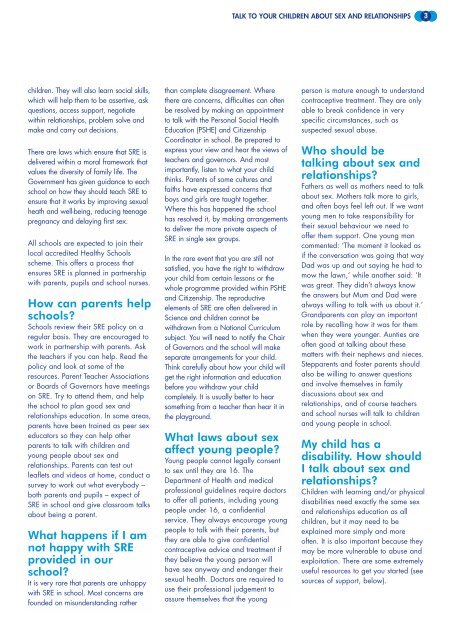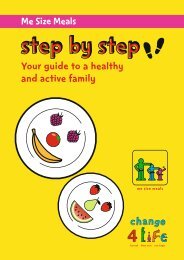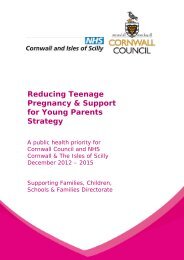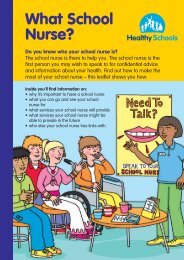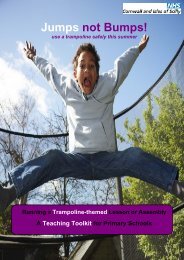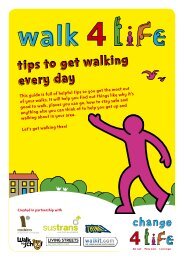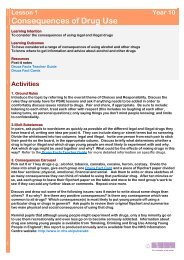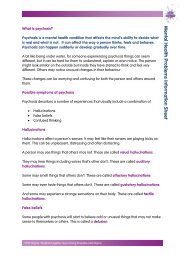Talk to your children about sex and relationships: support for parents
Talk to your children about sex and relationships: support for parents
Talk to your children about sex and relationships: support for parents
You also want an ePaper? Increase the reach of your titles
YUMPU automatically turns print PDFs into web optimized ePapers that Google loves.
TALK TO YOUR CHILDREN ABOUT SEX AND RELATIONSHIPS 3<strong>children</strong>. They will also learn social skills,which will help them <strong>to</strong> be assertive, askquestions, access <strong>support</strong>, negotiatewithin <strong>relationships</strong>, problem solve <strong>and</strong>make <strong>and</strong> carry out decisions.There are laws which ensure that SRE isdelivered within a moral framework thatvalues the diversity of family life. TheGovernment has given guidance <strong>to</strong> eachschool on how they should teach SRE <strong>to</strong>ensure that it works by improving <strong>sex</strong>ualheath <strong>and</strong> well-being, reducing teenagepregnancy <strong>and</strong> delaying first <strong>sex</strong>.All schools are expected <strong>to</strong> join theirlocal accredited Healthy Schoolsscheme. This offers a process thatensures SRE is planned in partnershipwith <strong>parents</strong>, pupils <strong>and</strong> school nurses.How can <strong>parents</strong> helpschools?Schools review their SRE policy on aregular basis. They are encouraged <strong>to</strong>work in partnership with <strong>parents</strong>. Askthe teachers if you can help. Read thepolicy <strong>and</strong> look at some of theresources. Parent Teacher Associationsor Boards of Governors have meetingson SRE. Try <strong>to</strong> attend them, <strong>and</strong> helpthe school <strong>to</strong> plan good <strong>sex</strong> <strong>and</strong><strong>relationships</strong> education. In some areas,<strong>parents</strong> have been trained as peer <strong>sex</strong>educa<strong>to</strong>rs so they can help other<strong>parents</strong> <strong>to</strong> talk with <strong>children</strong> <strong>and</strong>young people <strong>about</strong> <strong>sex</strong> <strong>and</strong><strong>relationships</strong>. Parents can test outleaflets <strong>and</strong> videos at home, conduct asurvey <strong>to</strong> work out what everybody –both <strong>parents</strong> <strong>and</strong> pupils – expect ofSRE in school <strong>and</strong> give classroom talks<strong>about</strong> being a parent.What happens if I amnot happy with SREprovided in ourschool?It is very rare that <strong>parents</strong> are unhappywith SRE in school. Most concerns arefounded on misunderst<strong>and</strong>ing ratherthan complete disagreement. Wherethere are concerns, difficulties can oftenbe resolved by making an appointment<strong>to</strong> talk with the Personal Social HealthEducation (PSHE) <strong>and</strong> CitizenshipCoordina<strong>to</strong>r in school. Be prepared <strong>to</strong>express <strong>your</strong> view <strong>and</strong> hear the views ofteachers <strong>and</strong> governors. And mostimportantly, listen <strong>to</strong> what <strong>your</strong> childthinks. Parents of some cultures <strong>and</strong>faiths have expressed concerns thatboys <strong>and</strong> girls are taught <strong>to</strong>gether.Where this has happened the schoolhas resolved it, by making arrangements<strong>to</strong> deliver the more private aspects ofSRE in single <strong>sex</strong> groups.In the rare event that you are still notsatisfied, you have the right <strong>to</strong> withdraw<strong>your</strong> child from certain lessons or thewhole programme provided within PSHE<strong>and</strong> Citizenship. The reproductiveelements of SRE are often delivered inScience <strong>and</strong> <strong>children</strong> cannot bewithdrawn from a National Curriculumsubject. You will need <strong>to</strong> notify the Chairof Governors <strong>and</strong> the school will makeseparate arrangements <strong>for</strong> <strong>your</strong> child.Think carefully <strong>about</strong> how <strong>your</strong> child willget the right in<strong>for</strong>mation <strong>and</strong> educationbe<strong>for</strong>e you withdraw <strong>your</strong> childcompletely. It is usually better <strong>to</strong> hearsomething from a teacher than hear it inthe playground.What laws <strong>about</strong> <strong>sex</strong>affect young people?Young people cannot legally consent<strong>to</strong> <strong>sex</strong> until they are 16. TheDepartment of Health <strong>and</strong> medicalprofessional guidelines require doc<strong>to</strong>rs<strong>to</strong> offer all patients, including youngpeople under 16, a confidentialservice. They always encourage youngpeople <strong>to</strong> talk with their <strong>parents</strong>, butthey are able <strong>to</strong> give confidentialcontraceptive advice <strong>and</strong> treatment ifthey believe the young person willhave <strong>sex</strong> anyway <strong>and</strong> endanger their<strong>sex</strong>ual health. Doc<strong>to</strong>rs are required <strong>to</strong>use their professional judgement <strong>to</strong>assure themselves that the youngperson is mature enough <strong>to</strong> underst<strong>and</strong>contraceptive treatment. They are onlyable <strong>to</strong> break confidence in veryspecific circumstances, such assuspected <strong>sex</strong>ual abuse.Who should betalking <strong>about</strong> <strong>sex</strong> <strong>and</strong><strong>relationships</strong>?Fathers as well as mothers need <strong>to</strong> talk<strong>about</strong> <strong>sex</strong>. Mothers talk more <strong>to</strong> girls,<strong>and</strong> often boys feel left out. If we wantyoung men <strong>to</strong> take responsibility <strong>for</strong>their <strong>sex</strong>ual behaviour we need <strong>to</strong>offer them <strong>support</strong>. One young mancommented: ‘The moment it looked asif the conversation was going that wayDad was up <strong>and</strong> out saying he had <strong>to</strong>mow the lawn,’ while another said: ‘Itwas great. They didn’t always knowthe answers but Mum <strong>and</strong> Dad werealways willing <strong>to</strong> talk with us <strong>about</strong> it.’Gr<strong>and</strong><strong>parents</strong> can play an importantrole by recalling how it was <strong>for</strong> themwhen they were younger. Aunties areoften good at talking <strong>about</strong> thesematters with their nephews <strong>and</strong> nieces.Step<strong>parents</strong> <strong>and</strong> foster <strong>parents</strong> shouldalso be willing <strong>to</strong> answer questions<strong>and</strong> involve themselves in familydiscussions <strong>about</strong> <strong>sex</strong> <strong>and</strong><strong>relationships</strong>, <strong>and</strong> of course teachers<strong>and</strong> school nurses will talk <strong>to</strong> <strong>children</strong><strong>and</strong> young people in school.My child has adisability. How shouldI talk <strong>about</strong> <strong>sex</strong> <strong>and</strong><strong>relationships</strong>?Children with learning <strong>and</strong>/or physicaldisabilities need exactly the same <strong>sex</strong><strong>and</strong> <strong>relationships</strong> education as all<strong>children</strong>, but it may need <strong>to</strong> beexplained more simply <strong>and</strong> moreoften. It is also important because theymay be more vulnerable <strong>to</strong> abuse <strong>and</strong>exploitation. There are some extremelyuseful resources <strong>to</strong> get you started (seesources of <strong>support</strong>, below).


